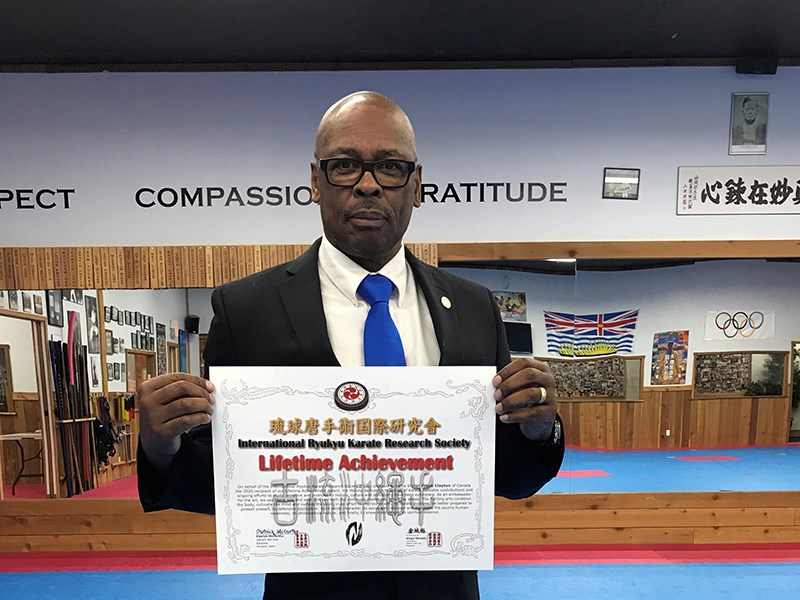Frank Clayton, sensei from Powell River’s Canadian Martial Arts Academy, recently received a lifetime achievement award from the International Ryukyu Karate Research Society. The society was established in Japan in 1989 by Canadian Patrick McCarthy, whom Clayton has known most of his martial arts career.
McCarthy’s webpage states that “the society was established to bring together like-minded people in pursuit of common goals while celebrating empowerment, personal achievement and camaraderie through the traditional fighting arts.”
Clayton’s martial arts career began in Montreal in 1969 and he opened up he’s first karate studio in New Westminster in 1982.
“I’ve had over the years about eight different studios,” said Clayton. “All of those studios ended up with students of mine and so we have a studio in Vernon, Chilliwack, Maple Ridge and the Lower Sunshine Coast.”
Clayton said what is learned by students in each studio is an art, not a sport, and more like dance and ballet.
“Each one of my students will come to me, practice with me and they will take what they’ve learned from me; I’m a very basic foundation and then they take the basic foundation and they work upon that,” he added. “So their students are going to look a little different than mine and so forth. It’s like having a different kind of restaurant, the recipes are a little different but their foundation is still the same.”
Clayton, who’s competed internationally for Canada, said he has had students start from age five and even had a woman start obtaining her black belt at the age of 65. How long it takes to acquire their belt depends on each person, said Clayton, who teaches younger students with goals and incremental belts.
“I’ve taken groups of people over to Japan about 18 times over the years, so we have two schools in Japan, a weapons school and a karate school over there,” he added. “The cultural experience for our kids and students in North America is one of the Eastern philosophies. They are based on respect, compassion, gratitude, loyalty, honour and integrity. Things we teach in our studio here are hard to teach, but we do our best to do that.”
Clayton referenced the John F. Kennedy quote: “Ask not what your country can do for you, ask what you can do for your country.” He related it back to what can be done for a community and uses the approach with how he teaches his students.
“That was part of the philosophy that I’ve taken into my karate studios,” said Clayton. “Most of my studios follow the same philosophy.”
Clayton said he never expected to receive the award and was honoured to accept it.
“I had come home from a karate class and on Facebook all these people were congratulating me,” he added, not knowing what the messages were about at the time. “I finally clicked on one and there you go, so you kind of sit there stunned, and then you just move on from that.”



